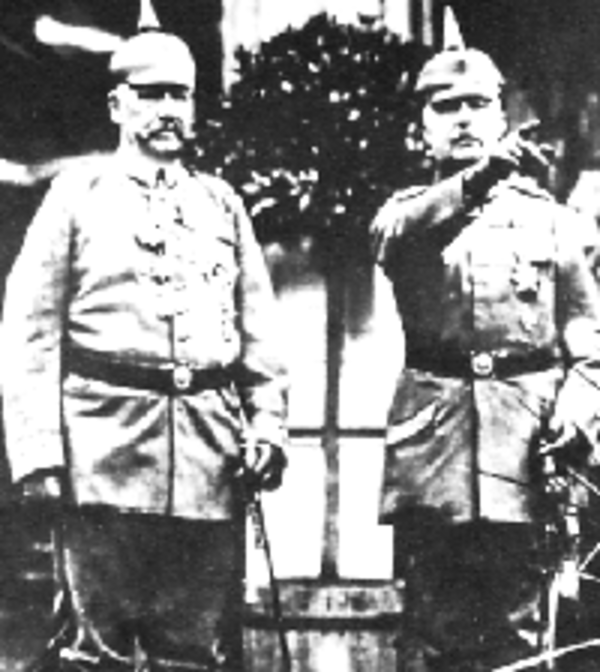Erich Ludendorff
Ludendorff was born in 1865 in Kruszewnia, near Posen in Germany. He was trained at Ploen and Lichterfelde and was commissioned into the German infantry in 1883. He quickly gained a reputation as a hard working and capable officer, so it wasn’t long before he was appointed part of the General Staff.
Ludendorff also gained a reputation for having very strong militaristic views, believing that war was an acceptable and effective way of nations asserting their dominance and maintaining power. In fact, he saw war as being the norm while peace was simply an interim. In light of this view, he also felt that the nation should always be prepared for war, with all national resources designed and created around making them more efficient in terms of their military.
This attitude reflected in significant support for the concept of unrestricted submarine warfare, which was put into action during World War One and was seen by Ludendorff as a justifiable means of defeating the enemy. His views did not even change in light of threats from the United States, who reacted with full force upon becoming a target of this aggressive war tactic.

When the war began in August 1914, Ludendorff was awarded the position of quartermaster general in von Bulow’s Second Army and was given the responsibility for attacking a series of forts in Belgium. This phase of the German plan of attack was vital to the success of the Schlieffan Plan, which Ludendorff had played a role in fine-tuning.
Upon successfully capturing the forts, Ludendorff was promoted to Chief of Staff to Paul von Hindenburg on the Eastern Front; while Hindenburg received much of the credit for their subsequent successes (including the Battle of Tannenburg), Ludendorff played a significant and well-noted role in tactical and strategic planning.
As a result of these victories, Hindenburg was promoted to Chief of Staff of the German Army in August 1916, and appointed Ludendorff his quartermaster general. He replaced Falkenhayn, who was demoted having failed to take Verdun.
Once in place as Chief of Staff, Hindenburg moulded the nation until it became well-oiled machine entered on the military. All forms of industry were targeted at military production and his leadership became known as the Third Supreme Command. Under this new regime, Kaiser Wilhelm II was essentially pushed to one side while Ludendorff was given an influential position as the head of all things political, military and economic across the state.
Now in a strong position, Ludendorff began to impose his views of aggressive military tactics, persuading Kaiser Wilhelm II to dismiss any senior figure who discussed the possibility of defeat or negotiation. This was demonstrated in 1917 when the Russians pulled out of the war, with the resulting peace agreement signed at Brest-Litovsk being incredibly harsh on the Russians.
Ludendorff continued to hold his stance, and this was demonstrated once more in the German Spring Push in 1918 on the Western Front - known by many as the Ludendorff Offensive. The action was part of Ludendorff’s master plan to launch a final, decisive blow against the Allies, which he believed would be followed by their demise. However, the push failed and Ludendorff quickly realised that Germany would no longer be able to win the war, particularly in light of the new support for the Allies from the United States.
Along with Hindenburg, Ludendorff transferred power back to the Reichstag in September 2018 and called for a peace settlement. Shortly afterwards, he changed his mind and called for war to be pursued once more. However, his creditability had been severely damaged and he was forced to resign on 26th October 1918.
Upon accepting the German defeat, and facing a backlash as the German people suffered from the flu outbreak as a result of an Allied blockade, Ludendorff decided he should leave Germany and travelled to Sweden. He spent a number of months writing articled that suggested left wing politicians had ‘stabbed’ the German Army in the back, which was an idea that was developed by Hitler years later.
Ludendorff eventually decided to return to Germany and became strongly involved in right wing politics - joining the Kapp Putsch March in 1920 and the Munich Putsch of 1923, the latter of which gave credibility to the relatively unknown Nazi Party. Although the putsch was a failure, it did result in fame for Hitler, who became nationwide figure thanks to the promotion from a German ‘hero’. Ludendorff was subsequently elected to the Reichstag as a representative of the party, standing against Hindenburg for the presidential election in Weimar Germany but only polling one per cent of the votes.
He remained in his position until 1928, when he retired and concluded that all the world’s problems were a result of the Jews, Freemasons and Christians; a view that led many to declare him an eccentric. He later rejected Hitler’s offer of becoming a field marshall and died on 20th December 1937 aged 72. Adolf Hitler attended his funeral.
MLA Citation/Reference
"Erich Ludendorff". HistoryLearning.com. 2026. Web.
